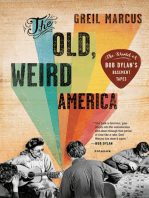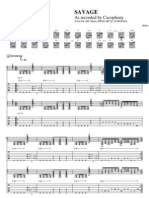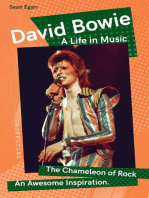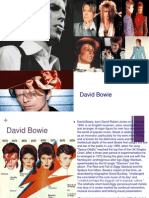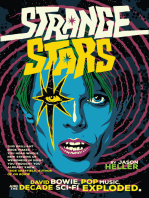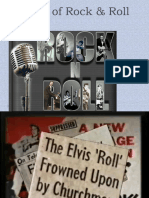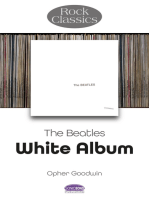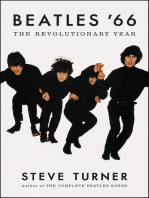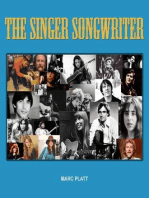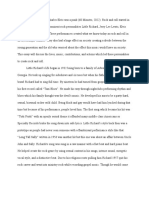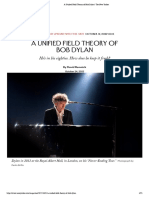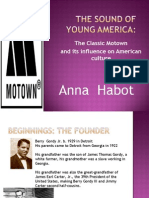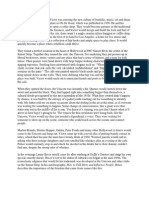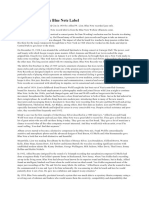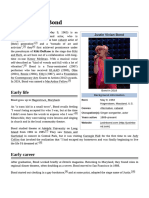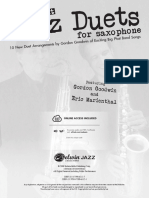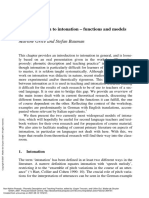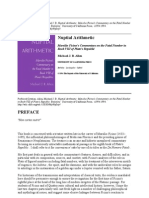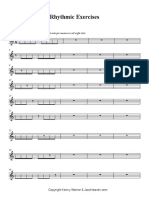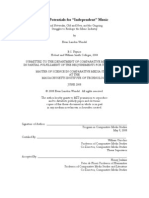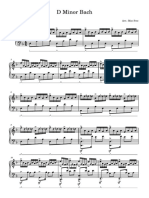Jimmy Page Boleskine House and The Occul-1
Jimmy Page Boleskine House and The Occul-1
Uploaded by
Carlos JiménezCopyright:
Available Formats
Jimmy Page Boleskine House and The Occul-1
Jimmy Page Boleskine House and The Occul-1
Uploaded by
Carlos JiménezOriginal Title
Copyright
Available Formats
Share this document
Did you find this document useful?
Is this content inappropriate?
Copyright:
Available Formats
Jimmy Page Boleskine House and The Occul-1
Jimmy Page Boleskine House and The Occul-1
Uploaded by
Carlos JiménezCopyright:
Available Formats
Jimmy Page, Boleskine House and the occult themes found in the British music
scene of the 1960s and 1970s
Dr David Harrison
Dr David Harrison gained his PhD in the origins and development of English Freemasonry
from the School of History at the University of Liverpool in 2008 and has subsequently
published numerous academic papers on the subject, as well has having fourteen books
published on the history of Freemasonry and Fraternal Societies. Harrison has lectured
history at the Continuing Education Department at the University of Liverpool and has
lectured modern history at Hope University, Liverpool. He has also designed and taught
history courses and managed history projects with the Adult Learning Services in Liverpool
and Knowsley in Merseyside, managing local history groups and advising on conservation.
‘I’m closer to the Golden Dawn/Immersed in Crowley’s uniform/of imagery’
Quicksand, David Bowie, 1971.
I met Jimmy Page and Robert Plant in the VIP area of Glastonbury Festival back in 1995. It
was a hot late June weekend of music set against the mystical backdrop of Glastonbury in
Somerset, and meeting these two icons of rock was obviously a high point. I was with a small
group of friends, and we were sunburnt and smiling as we chatted to them and shook their
hands. We watched them play live later in the evening as Page and Plant, performing old Led
Zeppelin classics. It was a memorable moment. About three years later I joined Freemasonry,
and it was a good few years after that I took an interest in the occult, especially in the career
of Aleister Crowley. If I had this interest back in 1995, I would have had numerous questions
for Jimmy Page. Hindsight is of course a wonderful thing....
Jimmy Page had a deep interest in the occult, especially Crowley, and this interest had
filtered into his work with Led Zeppelin; something that can best be seen on the cover of Led
Zeppelin IV, with the artistic play on the hermit from the Rider-Waite-Smith Tarot deck and
the use of signs and symbols. Crowley’s famous line ‘Do what thou wilt’ was even inscribed
in the run-off groove of Led Zeppelin III, and Page was to dramatically meet the hermit in a
dream sequence from the film The Song Remains the Same in 1976. Masonic and esoteric
symbolism has been frequently used by other rock bands from the period; the imagery being
commonly embedded within artwork used by bands from the mid-late 1960s onwards. Bands
such as The Beatles, The Rolling Stones, Black Sabbath, David Bowie and many others
utilised esoteric and occult imagery on their album cover art, in their music and in their stage
act. Behind these occult themes within their work lurked the ever present figure of Aleister
Crowley, Crowley being seen in the crowd on The Beatles classic 1967 album Sgt. Pepper’s
Lonely Hearts Club Band, and being name dropped in David Bowie’s beautiful song
Quicksand from his 1971 album Hunky Dory.
Page had met Bowie during the mid-1960s, both of them working in the London
music scene, and Page had actually played lead guitar on an early Bowie recording. Back in
1965 when David Bowie was David Jones, he and his band The Manish Boys recorded a
Boleskine Journal, Issue 5 – December 2021
blues cover called I Pity the Fool, which featured a fuzz box induced bluesy guitar solo by
the young Jimmy Page, who was at the time one of the most in-demand session players on the
London scene. Page and Bowie remained friends, and it was later maintained that Page had
given Bowie the riff that appears in a song called Supermen, which also features on Hunky
Dory.1 Bowie’s interest in the occult seems to have embedded itself into his music and fitted
well into the outsider themes that would be prominent in his work until his death in 2016. An
example of this can be observed as Bowie’s early 70s career progressed (along with his
cocaine use), he continued to delve into occultism and continued to refer to Crowley in his
work, most notably during his Thin White Duke persona. As Mark D. Griffiths puts forward
‘‘The thin white duke’ in his ‘Station To Station’ lyric is almost certainly taken from
Crowley’s erotic poetry (“The return of the thin white duke making sure white stains” from
the 1898 book White Stains).’2 According to David Buckley’s biography on Bowie Strange
Fascination, by the early 70s, Bowie had begun to regard Page ‘as a malevolent force out to
get him’, though Buckley also makes a note that some people thought that Bowie was merely
jealous of the success Led Zeppelin had gained in the US.3
It was in 1970 that Jimmy Page purchased the ultimate in Crowley memorabilia;
Boleskine House, though he didn’t actually stay in the house much during his ownership,
which lasted until 1992, preferring instead to install his friend Malcolm Dent in the house as
caretaker. Dent resided in the house with his family until Page sold the property, and in an
interview with the Inverness Courier in 2006, he mentioned how he and his family enjoyed
staying in the house, despite the ‘curious goings on’ there, such as the slamming doors in the
night and the mysterious opening of certain doors ‘as if someone was running through
them’.4 The purchase of the house certainly fuelled the persona of Page as a Crowley follower
who dabbled in magic, and rumours of Page’s dark magical interests soon spread through the
music industry and beyond.
Crowley had promoted the practice of listening to records backwards, for his
followers to think backwards and to talk backwards in his work Magick, which he said,
would lead the mind to the hour of birth and beyond to discover long lost memories and even
past lives. Recording backwards sounds and speech was something that The Beatles had
experimented with in their music, examples of what is termed ‘backward masking’ being
present on albums such as Sgt. Pepper and The White Album.5 This was something that Led
Zeppelin was later accused of using by Televangelist Paul Crouch in 1982, Crouch claiming
to have found numerous Satanic messages in Stairway to Heaven, a claim that was denied by
1
See https://faroutmagazine.co.uk/david-bowie-jimmy-page-pre-fame-song1965/ [Last accessed 15 July 2021]
2
See Mark D. Griffiths, Ph.D., ‘David Bowie’s Life at the Extremes: A brief look at Bowie, the occult, and
cocaine addiction’, www.psychologytoday.com/gb/blog/in-excess/201702/david-bowies-life-the-extremes
(February 15, 2017). [Last accessed 15 July 2021]. Mark D. Griffiths PhD is Distinguished Professor of
Behavioural Addiction and Director of the International Gaming Research Unit in the Psychology Department at
Nottingham Trent University (UK). In the article Griffiths examines a number of influences on Bowie’s music,
including Crowley and the occult.
3
See David Buckley, Strange Fascination; David Bowie: the definitive story, (London: Virgin, 1999), p.267.
The origins of Buckley’s excellent biography on Bowie lie in his doctoral dissertation, which he conducted at
the University of Liverpool in the Institute of Popular Music between the years 1988-1993.
4
Part of Dent’s interview can be seen in the article by Alison Campsie, ‘Jimmy Page and his black magic
Highland home’, The Scotsman, 14 December 2015 Jimmy Page and his black magic Highland home | The
Scotsman [Last accessed 21 July 2021].
5
For an analysis of the attitudes to backward masking in popular music during the 1960s-1980s, see David John
Oats and Greg Albrecht, Beyond Backward Masking: Reverse Speech and the Voice of the Inner Mind,
(Adelaide, South Australia: JOVAMHAZ PUBLICATIONS, 1988), pp.38-44.
Boleskine Journal, Issue 5 – December 2021
Robert Plant.6 Even Bowie was accused of backward masking on the track 1984 from his
1974 album Diamond Dogs, which according to David John Oats and Greg Albrecht’s book
Beyond Backwards Masking, when played backwards indicated that ‘Thou shall soon be
marked’ and that ‘Satan has come dancing’.7
So what was the attraction to Crowley for these rock n’ roll bands? Was it the old
search for fame and success or was Crowley just a source for inspiration? The exploration of
magic(k)8 was obviously a factor, though there seems to have been an attraction to Victorian
writers in general, writers such as Lewis Carroll and Oscar Wilde,9 who both appear in the
crowd on the Sgt. Pepper album, Lewis Carroll being an inspiration for John Lennon’s classic
song I Am the Walrus, while Wilde’s humour and sexually liberal attitude seemed to have
found a new sympathetic audience in the 1960s.10 Lewis Carroll had also experimented with
backwards writing in his work Through the Looking Glass, where, after Alice has stepped
through the looking glass, she noticed all the writing in a book was in reverse and could only
read it by holding it against the glass. Other nineteenth century writers in the famous Sgt.
Peppers crowd included H.G. Wells11 and Edgar Allan Poe,12 and Victorian artist Aubrey
Beardsley also made an appearance, Beardsley having illustrated some of Wilde’s work.
It is Crowley however who we keep coming back to in regards of major influence.
What was a very British occurrence soon spread to the US, where bands such as Coven
emerged in the late 1960s, touring with Jimmy Page’s Yardbirds and the Alice Cooper band
and becoming trail blazers for what would become known as Occult Rock. The band’s first
album Witchcraft Destroys Minds & Reaps Souls, released in 1969, contained a 13 minute
Satanic Mass and the album poster portrayed the band making the now famous sign of horns
while the female lead singer Jinx Dawson lay naked over a sacrificial altar. There was the
Italian based rock band Death SS, formed in 1977, which became a pioneer in what became
known as Horror Metal or Black Metal. Other bands that embraced the occult as part of their
musical style in the 1970s included the US based heavy metal band Pentagram and the
London based band Pagan Altar.
With connections to Crowley and the occult scene came rumours of curses as bad luck
began to plague the members of Led Zeppelin; Robert Plant’s son died in 1977 and drummer
John Bonham died in 1980. These, and other incidents fuelled numerous articles and books
on the subject of a curse, especially after the fire that occurred at Boleskine House in 2016,
with works such as The Led Zeppelin Curse: Jimmy Page and the Haunted Boleskine House
by Lance Gilbert, and articles delving into the supposed cursing of Jimmy Page by filmmaker
6
See Andy Greene, ‘The 10 Wildest Led Zeppelin Legends, Fact-Checked’, in Rolling Stone, (October 16,
2019), Led Zeppelin: 10 Wildest Legends, Fact-Checked - Rolling Stone [Last accessed 17 July 2021]
7
Oats and Albrecht, Beyond Backward Masking, p.43.
8
The Crowley use of ‘magick’ with a ‘k’ differentiated from the word ‘magic’, which was the domain of
illusionists rather than true magicians.
9
Oscar Wilde (1854-1900) was also a Freemason, being a member of Apollo Lodge No.357 while at Oxford
University. See David Harrison, The Transformation of Freemasonry, (Bury St. Edmunds: Arima Publishing,
2010), p.164 and p.192.
10
The feature film The Trials of Oscar Wilde, released in 1960 was a moving portrayal of Wilde’s fall from
grace, and presented Wilde in a sympathetic way. In 1962, Rupert Hart-Davis published the edited Selected
Letters of Oscar Wilde, which threw more light on Wilde’s life and work and again presented the playwright and
poet in a sympathetic fashion.
11
Though H.G. Wells (1866-1946) was not a Freemason, he did refer to Freemasonry in his work The
Inexperienced Ghost.
12
Edgar Allan Poe (1809-1849) was a leading American writer of mystery and the macabre, but was also an
influence on the use of cryptography in newspapers and magazines.
Boleskine Journal, Issue 5 – December 2021
Kenneth Anger, after a fallout regarding Page writing and recording a film score for Anger’s
Lucifer Rising.13
Certainly Page and indeed, Led Zeppelin, have entered into the complex Crowley
‘occulture’ and have added to the rich tapestry of dark history that swirls around Boleskine
House. The story encapsulates the larger British rock scene of the late 1960s and early 1970s,
with artists such as Bowie and The Beatles evidently flirting with Crowley and his work. The
occurrence of these occult themes in rock music did not fade away, it still continued to
influence rock bands into the 1970s and beyond, with the emergence of Occult Rock and
Horror Metal. In this sense, the occult themes and personality of Crowley himself continued
to influence and inspire musicians, filtering into strands of musical culture.
13
For a discussion on the curse of Jimmy Page by Kenneth Anger see Jack Whatley, ‘This is the reason Led
Zeppelin’s Jimmy Page was cursed by filmmaker Kenneth Anger’, Far Out Magazine, This is the reason Led
Zeppelin's Jimmy Page was cursed (faroutmagazine.co.uk) [Last accessed 21st July 2021]
Boleskine Journal, Issue 5 – December 2021
You might also like
- Pink Floyd All The Songs (Jean-Michel Guesdon, Philippe Margotin)Document868 pagesPink Floyd All The Songs (Jean-Michel Guesdon, Philippe Margotin)Fernando Olarte Márquez100% (1)
- Billie's Bounce Charlie-Parker-Omnibook PDFDocument2 pagesBillie's Bounce Charlie-Parker-Omnibook PDFAlessandro Norton100% (1)
- The Old, Weird America: The World of Bob Dylan's Basement TapesFrom EverandThe Old, Weird America: The World of Bob Dylan's Basement TapesRating: 3 out of 5 stars3/5 (2)
- Sly and The Family StoneDocument9 pagesSly and The Family StonebillNo ratings yet
- Bob Marley A Biography - David V. Moskowitz PDFDocument148 pagesBob Marley A Biography - David V. Moskowitz PDFMihaela ZăvoianuNo ratings yet
- Rock HistoryDocument19 pagesRock Historyitumelengjacobs100% (9)
- Rebel Rebel: All the Songs of David Bowie From '64 to '76From EverandRebel Rebel: All the Songs of David Bowie From '64 to '76Rating: 5 out of 5 stars5/5 (4)
- If You Like the Beatles...: Here Are Over 200 Bands, Films, Records and Other Oddities That You Will LoveFrom EverandIf You Like the Beatles...: Here Are Over 200 Bands, Films, Records and Other Oddities That You Will LoveNo ratings yet
- Psychedelics in The Age of Intelligent Machines, Terence MackennaDocument14 pagesPsychedelics in The Age of Intelligent Machines, Terence MackennaratnatanitaNo ratings yet
- (Guitar Tab) Cacophony - (1987) Speed Metal SymphonyDocument81 pages(Guitar Tab) Cacophony - (1987) Speed Metal Symphonywesker11100% (3)
- Media - David Bowie 2Document11 pagesMedia - David Bowie 2meganvellisNo ratings yet
- Bowie on Bowie: Interviews and Encounters with David BowieFrom EverandBowie on Bowie: Interviews and Encounters with David BowieRating: 5 out of 5 stars5/5 (2)
- Who Was David Bowie?Document10 pagesWho Was David Bowie?David BriceñoNo ratings yet
- Strange Stars: How Science Fiction and Fantasy Transformed Popular MusicFrom EverandStrange Stars: How Science Fiction and Fantasy Transformed Popular MusicRating: 3.5 out of 5 stars3.5/5 (18)
- History of Rock N RollDocument47 pagesHistory of Rock N RollcreateaivideosNo ratings yet
- Fame (David Bowie Song)Document4 pagesFame (David Bowie Song)Steven WrightNo ratings yet
- Sweet, Wild and Vicious: Listening to Lou Reed and the Velvet UndergroundFrom EverandSweet, Wild and Vicious: Listening to Lou Reed and the Velvet UndergroundNo ratings yet
- History of RockDocument14 pagesHistory of RockorangelzapataNo ratings yet
- Bob Dylan - Modern PoetDocument30 pagesBob Dylan - Modern PoetjelenaNo ratings yet
- Musica CulturaDocument5 pagesMusica CulturaRicardo CepedaNo ratings yet
- 25 Amazing Facts Everyone Should Know About David BowieDocument27 pages25 Amazing Facts Everyone Should Know About David BowiesaraNo ratings yet
- Paul ButterfieldDocument9 pagesPaul ButterfieldbillNo ratings yet
- Stevie Wonder's LifeDocument19 pagesStevie Wonder's LifeLorelay BoscaNo ratings yet
- Folk Music in The 1960'sDocument12 pagesFolk Music in The 1960'sGabrielle MeskoNo ratings yet
- History of RockDocument14 pagesHistory of RockGabriela CheaptanaruNo ratings yet
- A Guide to Essential Popular Music-Volume TwoFrom EverandA Guide to Essential Popular Music-Volume TwoRating: 4 out of 5 stars4/5 (1)
- Chapter 2 Early Rock PersonalitiesDocument5 pagesChapter 2 Early Rock PersonalitiesCrayton KorandaNo ratings yet
- Bowie In Berlin: A new career in a new townFrom EverandBowie In Berlin: A new career in a new townRating: 4 out of 5 stars4/5 (19)
- The CoastersDocument7 pagesThe CoastersasimNo ratings yet
- ch09-Outline.docxDocument6 pagesch09-Outline.docxpoisonhemlock77No ratings yet
- A Unified Field Theory of Bob Dylan - The New YorkerDocument25 pagesA Unified Field Theory of Bob Dylan - The New YorkerMartín Felipe Castagnet100% (1)
- McCarron - Light Come ShiningDocument233 pagesMcCarron - Light Come Shininglanguagefluency100% (1)
- The Sound of Young AmericaDocument27 pagesThe Sound of Young Americakalasanty100% (1)
- Buddy HollyDocument3 pagesBuddy Hollyapi-276376703No ratings yet
- The History of The Falcons and Joe StubbsDocument9 pagesThe History of The Falcons and Joe Stubbsapi-239173703No ratings yet
- Nightfly: The Life of Steely Dan's Donald FagenFrom EverandNightfly: The Life of Steely Dan's Donald FagenRating: 3 out of 5 stars3/5 (1)
- Album Review ProjectDocument5 pagesAlbum Review Projectapi-598497786No ratings yet
- Excerpt: "Another Side of Bob Dylan" by Victor and Jacob MaymudesDocument3 pagesExcerpt: "Another Side of Bob Dylan" by Victor and Jacob MaymudesOnPointRadioNo ratings yet
- Hawkwind AnthologyDocument22 pagesHawkwind AnthologyBryan PitkinNo ratings yet
- BluenoteDocument51 pagesBluenoteRoberto MuñozNo ratings yet
- O Hagan. 50 Momentos Del PopDocument13 pagesO Hagan. 50 Momentos Del PopNICOLAS MAGARILNo ratings yet
- Paul ButterfieldDocument9 pagesPaul ButterfieldgojuilNo ratings yet
- Bob DylanDocument314 pagesBob Dylanloucart1275% (4)
- Pink Floyd- Wish You Were HereDocument11 pagesPink Floyd- Wish You Were HereMike DinesNo ratings yet
- Justin_Vivian_BondDocument13 pagesJustin_Vivian_Bondmarina.wills.smithsonNo ratings yet
- The Velvet UndergroundDocument12 pagesThe Velvet UndergroundjackNo ratings yet
- Kooks, Queen Bitches and Andy Warhol: The Making of David Bowie's Hunky DoryFrom EverandKooks, Queen Bitches and Andy Warhol: The Making of David Bowie's Hunky DoryRating: 5 out of 5 stars5/5 (1)
- Stardust and The Spiders From Mars, Which Won Him Widespread Popularity. in 1975, Bowie'sDocument2 pagesStardust and The Spiders From Mars, Which Won Him Widespread Popularity. in 1975, Bowie'sMuthia DitaNo ratings yet
- A Tribute To Jackie LevenDocument11 pagesA Tribute To Jackie LevenJohn CrowtherNo ratings yet
- Dig Dis Hank Mobley PDFDocument2 pagesDig Dis Hank Mobley PDFGiulio Jesi100% (1)
- Safe and SoundDocument4 pagesSafe and Soundhuong trinhNo ratings yet
- Jazz Duets: For SaxophoneDocument4 pagesJazz Duets: For SaxophoneGabriel0% (1)
- Assessment PlanDocument3 pagesAssessment Planapi-273394578No ratings yet
- The Walls Come Tumbling Down Tapes - Daniel RachelDocument13 pagesThe Walls Come Tumbling Down Tapes - Daniel RachelTheodoreNo ratings yet
- Non-Native Prosody Phonetic Description and Teachi... - (An Introduction To Intonation - Functions and Models)Document28 pagesNon-Native Prosody Phonetic Description and Teachi... - (An Introduction To Intonation - Functions and Models)Ruby ParraNo ratings yet
- 41699967Document73 pages41699967Jeon KookNo ratings yet
- Allen - Ficino's Commentary On Plato's RepublicDocument268 pagesAllen - Ficino's Commentary On Plato's Republicvarnamala100% (1)
- Kenny Werner Rhythmic ExercisesDocument2 pagesKenny Werner Rhythmic ExercisesHåkan Bjuvenstedt50% (2)
- UntitledDocument8 pagesUntitledapi-233604231No ratings yet
- Ebi Sem 4 JulDocument22 pagesEbi Sem 4 JulCarla LimaNo ratings yet
- Music of Girolamo Frescobaldi For Classic Guitar Bill S Music Shelf - M0paf PDFDocument2 pagesMusic of Girolamo Frescobaldi For Classic Guitar Bill S Music Shelf - M0paf PDFFelis PardalisNo ratings yet
- Chs Tssec InfoDocument2 pagesChs Tssec InfohubrNo ratings yet
- Sow Topic 12Document3 pagesSow Topic 12Dayana Tajal AriffinNo ratings yet
- Into The UnknownDocument2 pagesInto The UnknownTelsaTuanNo ratings yet
- Vocal Music of The Romantic PeriodDocument24 pagesVocal Music of The Romantic PeriodAaliyah Joize Legaspi100% (1)
- GK BitsDocument88 pagesGK BitsmeghamvamaravalliNo ratings yet
- Evan Wendel, "New Potentials For 'Independent' Music: Social Networks, Old and New, and The Ongoing Struggles To Reshape The Music Industry"Document112 pagesEvan Wendel, "New Potentials For 'Independent' Music: Social Networks, Old and New, and The Ongoing Struggles To Reshape The Music Industry"MIT Comparative Media Studies/WritingNo ratings yet
- Little Green Wonder HW ManualDocument2 pagesLittle Green Wonder HW ManualJuan Carlos RussoNo ratings yet
- Technical Drawings of Musical InstrumentsDocument7 pagesTechnical Drawings of Musical InstrumentsFrancisco Gaete RodríguezNo ratings yet
- How To Improve Your Piano Skills FastDocument17 pagesHow To Improve Your Piano Skills FastThế Phương Gia LaiNo ratings yet
- Schema - Rulebook - 2022aDocument61 pagesSchema - Rulebook - 2022aAce LukeNo ratings yet
- Feliz Navidad Guitar 2 PartDocument5 pagesFeliz Navidad Guitar 2 PartMoko NugrohoNo ratings yet
- Solos Young Violists 1 Viola Part PDF - PDFDocument39 pagesSolos Young Violists 1 Viola Part PDF - PDFMartha Kalyniak100% (1)
- D Minor BachDocument6 pagesD Minor Bachswe422515No ratings yet
- Folklore Enterprises, Ltd. and Taylor & Francis, Ltd. Are Collaborating With JSTOR To Digitize, Preserve andDocument21 pagesFolklore Enterprises, Ltd. and Taylor & Francis, Ltd. Are Collaborating With JSTOR To Digitize, Preserve and78634232039808725No ratings yet
- The Rise of Sodom and GomorrahDocument10 pagesThe Rise of Sodom and GomorrahElvis Caballero TocasNo ratings yet



